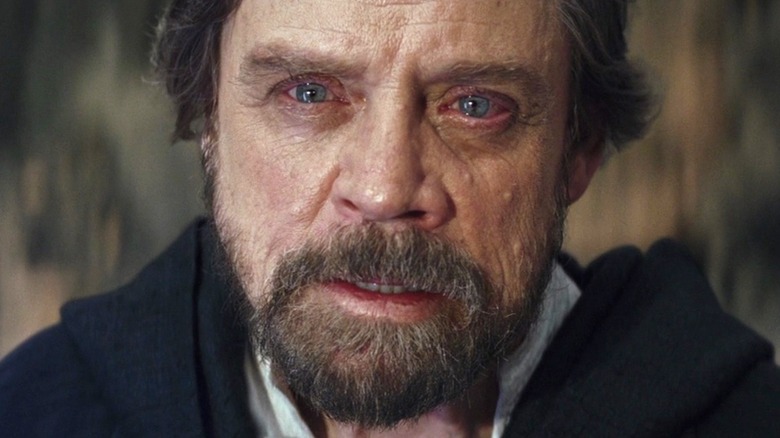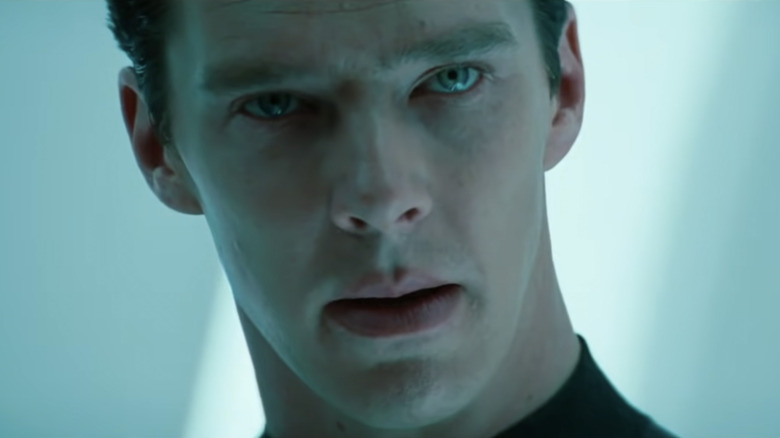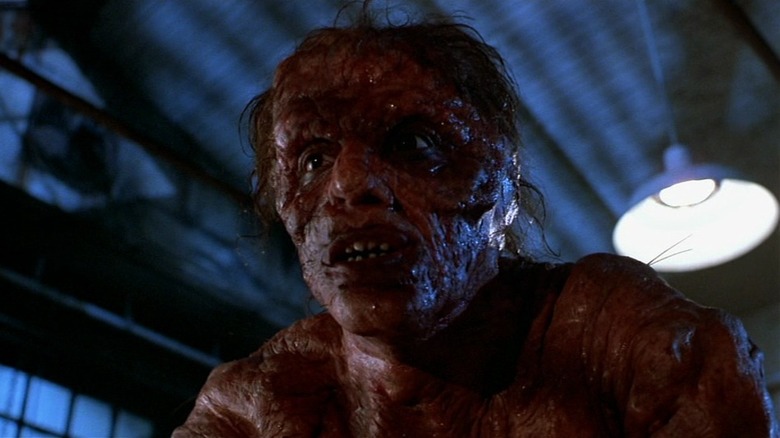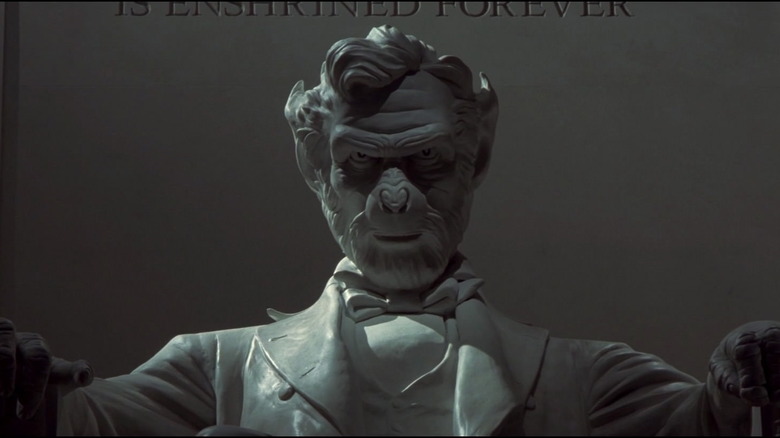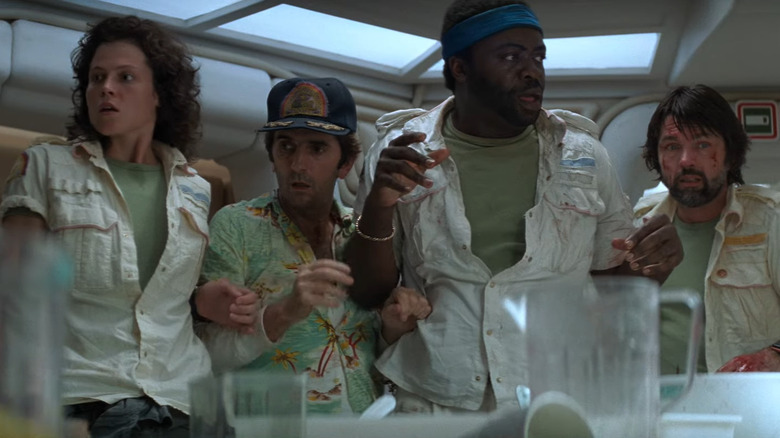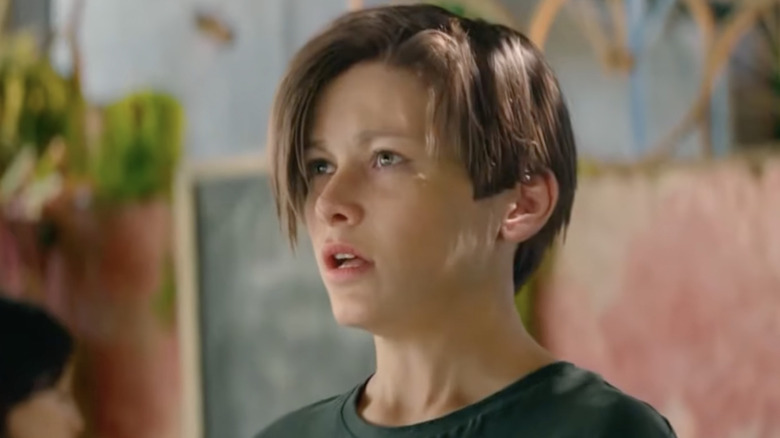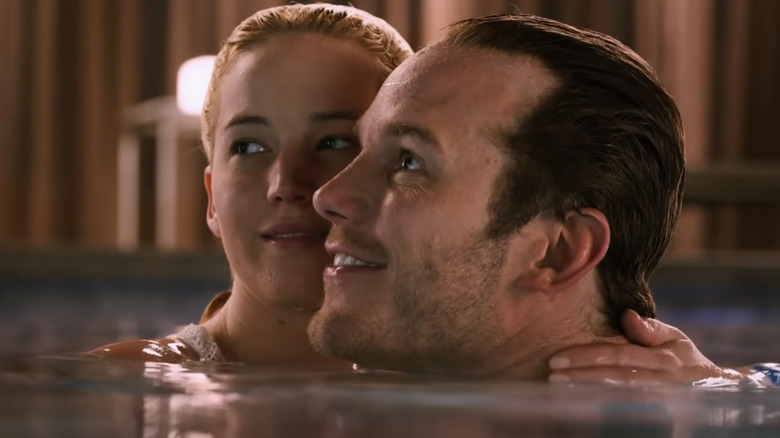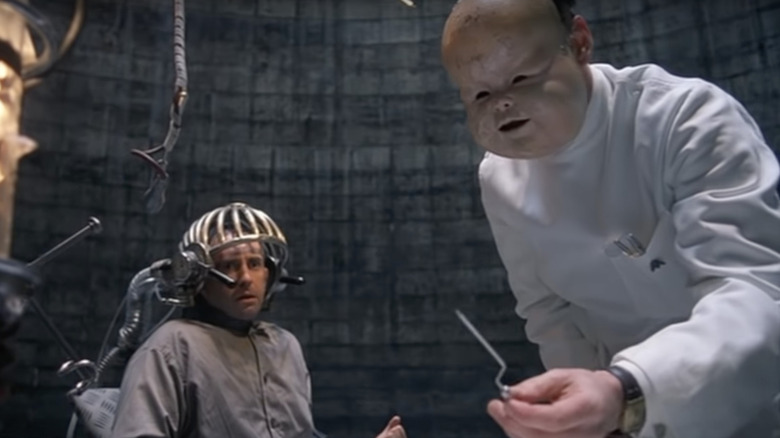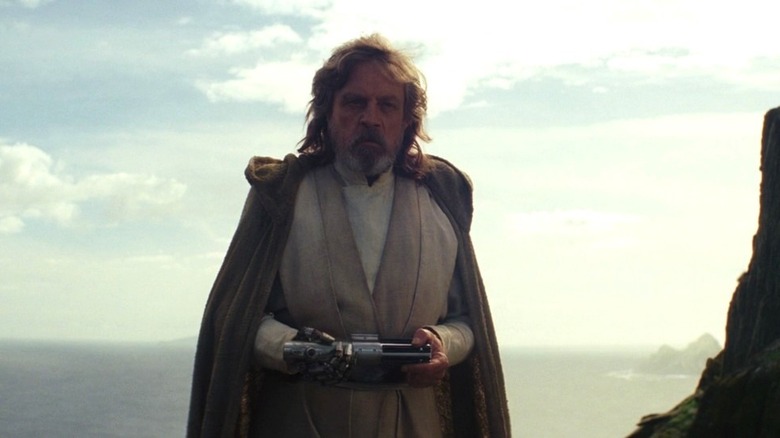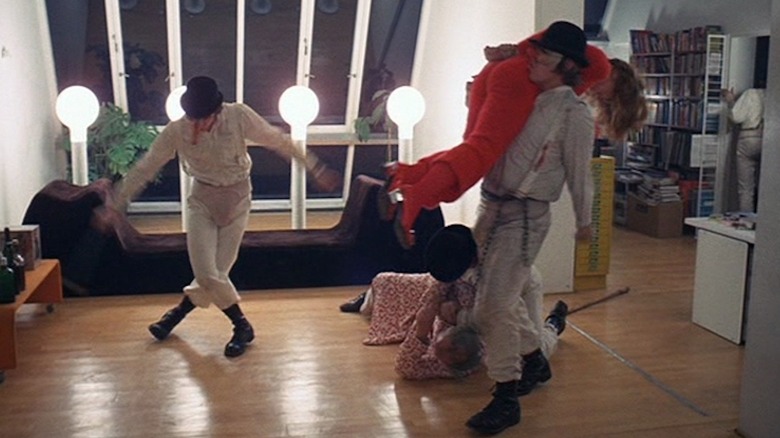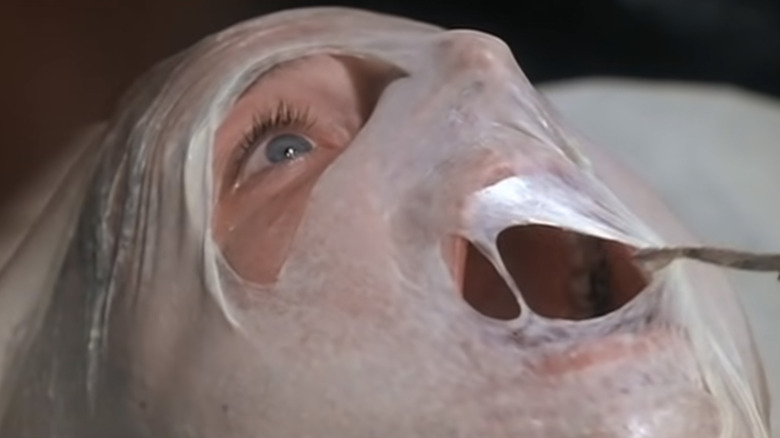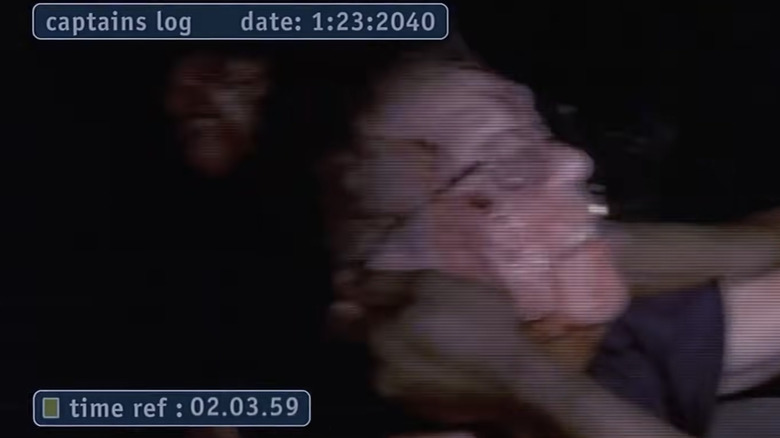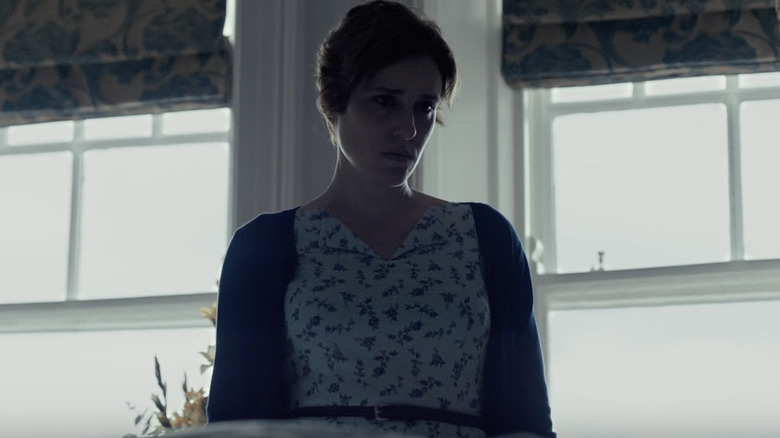12 Science Fiction Movie Scenes That Upset Fans The Most
Science fiction fans make for some of the most invested audiences on the planet. We'll buy merchandise, muse over fan theories, go to conventions, and pack movie theaters for showing after showing. Unfortunately, the problem with pouring a lot of emotional energy into your favorite movies is that one wrong turn in a film — or, in some cases, one horrifically right one — can leave you disappointed, disgusted, heartbroken, or just plain exhausted.
Sometimes that kick in the teeth is exactly what we want ... at least in the long run. A well-executed bit of upsetting darkness, tragedy, or gore can be the artistic flourish a movie needs to go from good to great. Some of the most upsetting movie scenes are masterfully upsetting. They may cut fans' emotions to shreds, but they do it in unforgettable ways. Unfortunately, sometimes movies just make bad and baffling choices that leave us outraged that we've wasted our time and money.
We've rounded up the highs and lows of our most upsetting sci-fi movie scenes, and they run the gamut from the powerful to the enraging to the groan-worthy. These are the ones that get a visceral response out of us, for better or for worse.
Khan?
In 2013, Benedict Cumberbatch was already a fan favorite thanks to his great work on BBC's "Sherlock." Audiences should've been delighted to have him turn up in "Star Trek: Into Darkness." The movie squandered all that good will with a lead balloon of a scene where Cumberbatch's character, previously known as John Harrison, dramatically revealed that his true name was Khan.
Khan Noonien Singh is one of the most memorable "Star Trek" antagonists ever. He's a ruthless, brilliant, and charismatic tyrant determined to get revenge against Kirk for stranding him on a frontier planet. Cumberbatch's Khan is wildly different in almost every way — including race. Khan was supposed to be from northern India, and while the original series failed to cast an Indian actor in the role, it did at least cast an actor of color. The sudden, random whitewashing of one of the series' most vivid villains left a sour taste in fans' mouths. As Reddit user faintingrobin put it, "As good an actor as Benedict Cumberbatch is, to whitewash one of the greatest sci-fi POC villains goes against everything 'Star Trek' is supposed to stand for."
On top of that, as user Gornashk pointed out in the same post, "[The reveal] falls so flat as a dramatic moment. ... The characters have no idea what that name is supposed to mean!" It tries to invoke the audience's nostalgia and make them gasp, but in context, it makes no sense — and audiences noticed.
Brundlefly
David Cronenberg's 1986 remake of "The Fly" is a potent, beautifully acted fable about the slow destruction of disease. It's also one of the most stomach-churning body horror movies of all time.
When scientist Seth Brundle (Jeff Goldblum) drunkenly tests out his teleportation machine, he winds up genetically splicing himself with an intruding housefly. The resulting creature — Brundlefly — is incredibly strong and virile but also covered in bristling hairs and sores, with fingernails falling off. The mutation starts small, but it gets worse and worse ... and worse. A key turning point comes when Seth starts to eat a donut in front of Ronnie (Geena Davis), his horrified girlfriend — but he can only eat it the way a fly would: He retches acidic vomit all over it to start dissolving it first. Even he has a moment of clarity where he admits that it's disgusting.
It's hard to even think about this scene without triggering your gag reflex, and horror fans have always had an understandably strong reaction to it. Reddit users unsurprisingly brought it up in a thread on horror movies you definitely don't want to watch while eating, with nyquill81 saying, "The scene where he's showing Geena Davis how he eats made me gag." User vampirebloodgod1991 seconded it, saying, "Oh tell me about it. It took me several days to work up the courage to eat donuts again after that scene." It's a rare scene that can drive someone away from donuts, but this one manages it.
Ape-raham Lincoln
No amount of genuinely impressive ape make-up and prosthetics can make up for the ending of Tim Burton's 2001 "Planet of the Apes" remake, which Esquire deemed "the worst movie ending ever."
When Mark Wahlberg's astronaut character, Leo, returns to Earth and his own time, he crashes in front of the Lincoln Memorial — except the memorial now comes with the sculpted ape head of his nemesis, Tim Roth's General Thade. Yep, it's a newly created timeline where, thanks to a time-traveling Thade, apes are the dominant species on Earth ... and the Lincoln Memorial design was apparently so aesthetically powerful that the apes independently conceived of the structure to honor their game-changing historical figure.
The Guardian reports that some Americans took the ending as a slight to the real Abraham Lincoln, but we'll admit that our reasons for hating this ending aren't that high-minded. We just think it's ridiculous. As Esquire put it, even after you wade through all the possible time-travel explanations, "There is no single truth about 'Planet of the Apes” climax, other than that, logic be damned, Burton was determined to sideswipe audiences with a twist that featured another iconic American landmark." We're pretty sure the classic Statue of Liberty revelation at the end of the original movie doesn't have to worry about being upstaged by the sheer stupidity of Ape Lincoln.
The chestburster
"Alien" sits near the top of both the horror and science fiction genres, and it also boasts what is, hands down, one of both genre's most memorable and most viscerally disturbing scenes.
We're talking, of course, about the chestburster. The crew of the Nostromo learns about the alien's incubation period in the worst possible way when Kane (John Hurt) has his chest erupt in a geyser of blood. A small creature that looks like a razor-toothed, enraged, elongated lizard-eel explodes out of him and scurries away. It's a revolting little figure — especially since it's still all slimy with Kane's blood — but the real horror of the scene comes from the bizarre inside-out violation of the human body. People just aren't supposed to do that. "Alien" draws on anxieties about pregnancy, and here it makes one life emerging out of another a terrifying, parasitic, and, well, alien concept that leaves us wanting to crawl right out of our skin.
Needless to say, it had quite an effect on unprepared audiences back in 1979. According to Yahoo! News, one theater owner actually trimmed the scene from the reel because it was resulting in so much nausea that it "really messed up [the] bathrooms." Former studio executive Alan Ladd Jr. said that he saw another kind of physical response — one a little less showy but no less telling: People just froze in sheer terror and shock.
So much for John Connor
In a fanbase-breaking move, "Terminator: Dark Fate" cut through the franchise's complicated, Gordian knot-like history. In the first scene, it unceremoniously kills off series staple John Connor.
Having humanity's supposed champion gunned down as a child, killed by a Terminator — another T-800 played by Arnold Schwarzenegger — is certainly a game-changer, but it's not surprising that it didn't go down well with a lot of long-time fans of the franchise. If you like the game, you don't necessarily want it to change.
As Bloody Disgusting noted, "The decision has proven quite polarizing with 'Terminator' fans, many of whom were excited to hear that Edward Furlong's John Connor would be back but were ultimately left wishing the character hadn't been brought back at all." It wasn't just losing a key character in a throwaway manner that frustrated fans either. A piece on the website The Terminator Fans explained the scene harmed the overall structure of the other series, saying, "One of the issues we (and many other fans) have raised is that killing John impacts on watching the first two movies in a negative way. When you watch them back, the stakes and importance of keeping John alive are completely nulled." They issued the ultimate fan dismissal of unwanted series events and declared that, for them, the movie didn't count as canon.
A love story
For a lot of viewers, the fundamental problem with the 2016 film "Passengers" is that the upsetting scene affects everything else in the movie. Audiences were lured in by a trailer that seemed to promise an unusual, bittersweet space rom-com where two passengers are mistakenly awakened from hibernation years too early, dooming them to spend the rest of their lives in a mostly empty spaceship. What they got, as the internet soon discovered, was a movie where Chris Pratt's Jim wakes up first, which adds a creepy, manipulative edge to his eventual decision to wake up Jennifer Lawrence's Aurora — a stranger to him — and romance her.
The news of the movie's actual premise broke widely enough, with Twitter users calling the movie a "disgusting stalker fantasy" that's "about a stalker with a corpse fetish," that audiences could at least steel themselves for Jim "falling in love" with a sleeping Aurora and deciding to wake her up. They still had to deal with that ending though. At first, Aurora's shock and rage at realizing Jim has effectively condemned her to a lifetime of near-solitude may prime anti-Jim viewers to think the movie will end up more horror — or at least more serious, consequence-driven drama — than romance. Nope. "Passengers" wraps up with a happy ending for Jim and Aurora, giving them a lifelong love. It's a conclusion that leaves us profoundly dissatisfied.
Happy ending
Terry Gilliam's surreal dystopian film "Brazil" ends with main character Sam reuniting with love interest Jill and escaping his sadistically bureaucratic world ... but as it turns out, it's all in his head. He's still a prisoner of the government; they've just tortured him until he's lost his mind.
It's a bleak ending, and some early commercial releases altered it to leave out the "it was only a dream" punchline. This is now known as the "Love Conquers All" cut, which also reduces the story's darkness overall. We prefer Terry Gilliam's original — now restored — version, but "upsetting" is certainly the word for it. At The Dissolve, Scott Tobias said, "The end of this movie ... is one of the saddest and most devastating I can recall, simultaneously ripping us away from the happy vision of Sam's escape and situating him in the middle of this vast, lonely, hopeless place."
Viewers have spent a lot of time analyzing the ending and even getting a little bit of hope out of it. After all, at least Sam is now free, even if only in his fantasies. Others aren't so convinced. When a Reddit post opined, "I think [the 'Brazil' ending is] quite nice, in a weird way," an anonymous user retorted, "It [wasn't] nice for the audience." That's arguably the consensus opinion, with one Reddit user writing, "The ending is such a gut punch," and another saying, "How cutting is that ending?" One thing's for sure — it's absolutely unforgettable.
Luke tosses the lightsaber
Few franchise installments have caused as much contention as 2017's "Star Wars: The Last Jedi," which bucks series traditions in a way that — depending on who you ask — is either exciting and reinvigorating or deflating and counter to the spirit of "Star Wars." One of the most argued-about scenes comes when Rey finally returns an aged Luke Skywalker's lightsaber to him, and he hucks it over his shoulder.
Reddit threads on the scene show how fans still boggle over it and how they see it as a fundamental example of how the film simply doesn't work for them. "All of my hopes of Jedi Master Luke being the badass of my childhood dreams were instantly shattered," Reddit user kalisto3010 wrote. Other fans say that while a more somber rejection of the lightsaber might've worked, the comedic execution just makes it feel trivializing.
Yes, Luke also tossed his lightsaber aside in "Return of the Jedi," but bulletproof5fdp points out that there's a major difference in context. In "Last Jedi," this isn't Luke showing that he's willing to die rather than do Palpatine's bidding. "There is no real reason provided for Luke to toss his lightsaber other than for the sake of a cheap gag. It was nothing more than a deliberate middle finger to fans who were waiting for what Luke would do after two years since [The Force Awakens] released."
Singin' in the Rain
"A Clockwork Orange" is an electric, pitch-black satire about youth, violence, and how society handles — or mishandles — both. It's brilliantly made and impossible to forget ... which is almost a drawback when the film has scenes we'd absolutely prefer to forget. Unfortunately, the cynicism and horror of "A Clockwork Orange" are seared into our memories.
Alex DeLarge and his droogs get up to a lot of "ultra-violence," but one scene has always stood out as particularly intense — the brutal home invasion that caps Alex's big night on the town. The ensuing beating and rape are hard enough to watch with the sound off, but when you add Alex's exuberant rendition of "Singin' in the Rain," the scene gets even more twisted. On That Moment In, Dan Viau reviewed the scene as the most memorable in the movie, writing, "It's the only time I can remember fast forwarding a movie because of disgust. The innocence of the music paired with the sexualized violence and gleeful delight of the assailant was too much to understand. I simply couldn't combine these contrasting images."
The scene became even more notorious when (per PBS) it apparently influenced a real-life case of sexual assault, one where the crime also featured a horrific performance of "Singin' in the Rain." Stanley Kubrick chose to pull the film from any release in the United Kingdom, where the protests against it — and the coverage of potentially related "copycat" cases — were getting the most attention.
If you or anyone you know has been a victim of sexual assault, help is available. Visit the Rape, Abuse & Incest National Network website or contact RAINN's National Helpline at 1-800-656-HOPE (4673).
Alien abduction
1993's "Fire in the Sky" may not have the widespread cultural significance of "Alien," but this is another sci-fi horror film that fans of the genre shouldn't miss ... even if they have to white-knuckle their way through one of the most disturbing alien abduction scenes we can think of. Horror audiences have strong stomachs, but the unsettling combination of the bizarre and the banal of the "Fire in the Sky" flashback scene — featuring Travis Walton being examined by his alien captors — still hits remarkably hard.
It has, accordingly, become notorious among sci-fi and horror fans. Retrospective pieces have covered how convincing and grueling the scene is, and Reddit threads on the topic show the profoundly nightmarish effect it has on viewers. In one post on the movie, multiple commenters chimed in that they'd first seen the movie as children, guaranteeing themselves weeks and even years of nightmares. "I had a breakdown when I was home alone and my house was creaking at night time," redmasc wrote. Some fans couldn't even bring themselves to revisit the movie in adulthood. When it comes to gooey fluids and needles slowly heading towards eyes, sometimes one viewing is enough.
The Event Horizon's log
"Event Horizon" had a troubled production, and it sank like a stone upon its 1997 release, but time and word-of-mouth have turned it into a bona fide cult classic. If you've heard of it, you've almost certainly heard about the captain's log scene.
The Event Horizon is a once-lost spaceship that's been recently recovered — with all its crew missing. When the rescue team uncovers the former captain's log, they start to understand what they're dealing with. It's a incredibly horrific montage that illustrates the previous crew's descent into Lovecraftian turmoil, complete with torture, self-mutilation, and murder. Reportedly, some theaters even made audiences sign waivers because of previous uproar about the scene's violence.
What makes it all so brilliant is that the images flicker by so fast that it can be hard to even process what you're seeing — but your subconscious picks up on it whether you like it or not. Horror fans have made a hobby out of slowing down the captain's log and pulling out individual still images to highlight the atrocities on display.
As Reddit comments point out, this scene racks up the tension to almost unbearable levels — so much so that theater audiences really needed the comedic beat that came afterwards. As one user wrote, "I saw this in the theater with my friend, and right after the video log plays and Fishburne says, 'Alright, let's get out of here,' the whole theater broke out in this crazy nervous laughter. Like everyone stopped holding their breath."
Dog death
Animal deaths are notoriously upsetting to audiences, especially when it comes to pets like dogs and cats. Chances are, any animal death in any movie has left its share of horrified viewers behind — but within the sci-fi genre, one particular dog death has to take the prize.
"The Lobster" is a surrealist, difficult-to-classify film where people who are unable to find partners — ones with whom they have a rigidly defined compatibility — are turned into animals. The dog that accompanies Colin Farrell's character, David? That's his brother, who's already gone through the transformation process. When David makes the mistake of trying to pretend he's the perfect match of a character known only as the Heartless Woman, she eventually doubts that he's as callous as he's acting ... and she tests his supposed sociopathy by informing him she kicked his brother to death. As we soon discover, she's not lying.
Viewers sometimes champion this as the saddest and most disturbing animal death in the movies. "That woman scared me more than any movie monster in years," Reddit user magimack wrote. "Up until they showed her [bloodied] leg, I thought she didn't really do it." Another commenter, Soulja_Boy_Yellen, mentioned how difficult the scene is to endure. "I'm fine with human deaths in movies, but I almost walked out with that." It's a harrowing, horrifying combination of a dog's death and a brother's death, and the flat way the Heartless Woman relays the information to David makes it absolutely agonizing for audiences.
